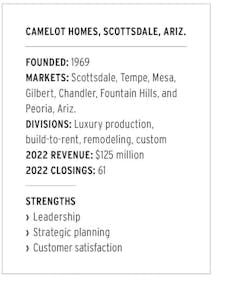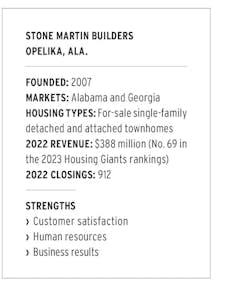2024 National Housing Quality Awards for Operational Excellence
Gold-Worthy: Camelot Homes Earns the NHQA's Highest Honor
The Arizona home builder's commitment to continual improvement pays off by achieving the highest level in Pro Builder's National Housing Quality Awards for operational excellence
Having earned Bronze from the National Housing Quality Awards (NHQA) in 2021, Camelot Homes anticipated it would fair even better when the Scottsdale, Ariz.-based builder applied again this year.
That first go-around, when a team of NHQA examiners (including previous Gold recipients) made an intensive, two-day site visit to view and vet Camelot’s operations, “We didn’t know what to expect,” says Julie Hancock, Camelot’s managing director and co-owner with her husband, Mark. “Some on our team had a deer-in-the-headlights look.”
But this year, as examiners made their visit and spoke with employees at different levels, Camelot’s leadership noted how much its staff members had progressed. “I could see more confidence and pride as they answered questions,” she says.
That maturity reflected the hard work and progress made on various operational improvements since Camelot’s first NHQA foray—a clear indication that action plans stemming from its previous experience were taken to heart throughout the organization.
In some respects, Julie Hancock says, that had just as much impact on the builder as earning a Gold award this time around.
Moves to Improve
Like all companies that participate in the NHQA process, the 54-year-old home builder had plenty to chew on after receiving its first feedback report, a 20-plus page evaluation of Camelot’s answers to the 167-question application.
“One of the biggest things we addressed right off the bat was KPIs [key performance indicators],” recalls Kevin Rosinski, Camelot’s chief operating officer. While the company already had well-established KPIs for the organization as a whole, it went a step further by developing them for individuals, so every employee would better understand how their work relates to business goals. That effort showed in how much better employees handled the NHQA site visit this year.
The company also accelerated efforts to improve a key business goal: reducing the vulnerability of its luxury production niche, which has average home prices of $2 million to $3 million, if or when demand for high-end homes should sputter. In response, Camelot launched two new divisions—one focused on remodeling and another on truly custom homes—which have delivered the desired diversification.
More recently, a new division for single-family, build-to-rent homes further broadened the builder’s business scope. The new ventures help insulate Camelot from industry shocks, Julie Hancock says, though the NHQA examiners noted potential hurdles, especially with the rental division.
To better react to market ups and downs, Camelot also developed what it calls a “heat index” based on various business and economic data points. The index consists of four tiers, with Tier 1 indicating the most favorable market conditions and Tier 4 showing sharp recession.
Each tier is linked to actions Camelot can take to respond to changing circumstances. For example, the company may increase the amount of land it holds in inventory when conditions are good, and reduce it when conditions deteriorate.
The heat index tool was inspired by comments from NHQA examiners for the 2021 award and is a treasured, lasting legacy. “I don’t know of any home builders who have something like this,” Julie Hancock says. “It’s something I am very proud of.”
Camelot managers also made it a priority to reduce barriers between divisions and to strive for consistent quality of service across business lines. “We should treat our rental owners the same as our custom owners,” Rosinski adds. “It should be the same experience for end users moving into a rental as it is for those who are moving into a custom home.”
After the company’s initial NHQA experience, division department heads began meeting every other week to solve common problems, and those discussions continue to provide a forum that breaks down organizational barriers.
In addition, once every quarter, the builder hosts a companywide, day-long, off-campus meeting for division managers to review processes and experiences in more detail.
Progress Scores Points
The progress Camelot made to better coordinate divisions and hone its strategic vision impressed this year’s NHQA examiners: “The company knows exactly who they are, who their customers are, who they want to be as an organization, and what works within their niche in the market,” the feedback report noted.
This year, however, Camelot didn’t wait to receive the report to start addressing recommendations gleaned from the site visit. “Based on that, we asked each department head to pitch their top three things to work on for the year,” Rosinski says.
Senior leaders reviewed those pitches and chose one area of focus for each department, including:
- Accounting: revamping reporting systems to be more automated, creating real-time responses, measuring goals, and quickly identifying where goals aren’t being met.
- Customer care: Staff will more closely coordinate how the company engages with buyers from the walk-through process to post-close contact.
- Trade relations: This is where Camelot scored lowest among NHQA’s eight sections and it will be an area of focus, with an emphasis on better defining shared core values and vision. “We’ve always met with trades, but we now have more targeted roundtable discussions,” Rosinski says.
These focused meetings not only foster culture sharing, he says, but also can result in more specific action items. For instance, when Camelot recently found that about 85% of its trade partners use Hyphen Solutions’ residential construction management software, it decided to start using it as well, Rosinski says, adding that the builder also will implement a new paperless payment system, something its trade partners have been clamoring for.
Gold-Worthy?
When evaluating initiatives to bolster relations with trades, Camelot company leaders now tend to ask, “Is this Gold-worthy?” —a shout-out to the builder’s two NHQA experiences. In fact, it’s a new catchphrase used at Camelot when gauging how well any program is working; a mantra indicating the company’s pride in the award and the level of quality the honor reflects.
Indeed, Camelot will continue to celebrate earning NHQA Gold, but it is on guard against complacency. “This award is not an end game; it’s the beginning,” co-owner Mark Hancock says. Accordingly, the company may decide to apply for an NHQA award again in a few years. Adds Julie,“We love the process and specificity of the feedback we get.”
What is NHQA?
The National Housing Quality Award (NHQA) is a rigorous, comprehensive examination of a home builder’s operational practices and performance.
Modeled after the Baldrige Performance Excellence Program and ISO 9000 concepts for quality management systems, the NHQA process dives deep into a builder’s leadership and strategic planning, human resources, construction quality, and business results, among other aspects.
Builders spend weeks completing a 167-point questionnaire that is then evaluated and scored by previous NHQA Gold award recipients and industry-specific quality management experts. A select few applicants earn a two-day, in-person site visit by an NHQA examination team for further vetting.
Regardless, all applicants receive a lengthy and detailed feedback report, including how they scored on a scale of 1 to 5 in each section of their application, kudos for industry-leading performance, and tips for improving their business operations.
Stone Martin Builders Awarded Bronze in the 2024 National Housing Quality Awards
By earning a Bronze award, Stone Martin Builders is well on its way to becoming one of the industry’s best-run companies
A (Big) Step in the Right Direction
At the outset of a debriefing meeting about its National Housing Quality Award feedback report, Stone Martin Builders’ COO John Manasco says the company’s leadership team “stared at each other in bewilderment.” The feedback report about the state of the Alabama-based builder’s operations was so thorough that “we were a bit overwhelmed,” he admits.
But as Manasco and his team expected, the report was a mixed bag—despite the NHQA examination team awarding Stone Martin Builders (SMB) Bronze on its first time entering NHQA. “We got some reassurance that we were heading in the right direction,” he says, “but it also showed some shortcomings. We’d done all sorts of third-party consulting before, but this was by far the most consequential program we’ve experienced.”
Lessons Learned
Some of the recommendations in the feedback report would be relatively easy to address and implement; a suggestion to be more diligent about documentation, for instance, could be tackled by the builder immediately.
Other recommended action items, such as better utilizing data and making SMB’s strategic planning process more structured, would take time and require concerted action by multiple departments.
The NHQA examiners had remarked on SMB’s ability to use data to provide a broad view of operational performance, but pointed out the data could be better leveraged to gauge operational effectiveness and to understand how business results link to strategic plans. “You can have all of the data in the world,” Manasco says, “but if you don’t have it organized and consolidated in a transparent manner for everyone, then you can’t execute the vision.”
Taking Action
In response to this feedback, the company recently launched a “Culture of Care” program to improve operations and strategic planning. “It’s not just about making customers happy and increasing sales,” says Adam Middleton, SMB’s director of innovation. “It goes beyond that.” A key focus of the program will be on how SMB treats people and handles situations, Manasco says.
Having recently undergone a leadership transition, the company’s new generation of leaders wants to imbue the organization with their vision. “We’ve had great growth and have posted great numbers, but it’s easy to lose sight of the building blocks you need to transition from being a good operator to being a great one,” Manasco points out. The newly minted Culture of Care program is a big step toward addressing that.
The company kicked off the program in August, soon after receiving its NHQA feedback report, with a two-day leaders’ meeting to develop and articulate the organization’s vision, purpose, and core values.
Leaders also planned how they would disseminate that information throughout the company. “To be effective, a strategic plan must get buy-in from all departments and all employees,” Manasco says. “We have to be unified.”
Constantly reinforcing values will ensure employees embrace that cultural vision, Middleton says. For instance, daily stand-ups and wind-downs help both reinforce company values and link them to accomplishments. “We will also celebrate our employees’ strengths and address where they are getting off track,” he says.
Some areas for improvement are aspirational. For example, the judges recommend that all builders—not just those they evaluate—avoid back charges. “But in our market, with the trades we use, that’s just not realistic,” Middleton says. He adds, however, that working to reduce back charges is a feasible goal.
And while the company’s personnel policies look good on paper, the NHQA report noted that SMB could improve follow-through in some cases. For instance, employees are granted 15 hours of paid time off annually to perform charitable work, but few, if any, take advantage of it. “We asked employees about this benefit, and no one even knew about it,” Middleton says. “It’s in the employee handbook, but is hard to find.”
A Worthwhile Endeavor
Such matters are easy to overlook, given the pressures of day-to-day deadlines, but they really come to light when outsiders—especially those with deep experience in the home building industry—provide an objective view. “We wish we had done NHQA sooner,” Middleton says. “It would have exposed deficiencies we could have fixed. I think every company should do this.”
Freelancer Peter Fabris has reported on the built environment for more than 15 years in this and other industry publications.








